By fashioning its global profile around the Belt and Road Initiative (BRI), China is pursuing an enormously disruptive challenge to the established rules-based international system. The pitfalls of the BRI are serial − stretching last week alone from Malaysia via Pakistan to South Africa − and are eclipsing development advantages.
Take the example of Hambantota port in Sri Lanka, which was handed over to Beijing under the pressure of an enormous $8 billion debt schedule that Colombo could not afford. It exposed the BRI as a tool for China to force debt-to-equity swaps on distressed developing nations. This, in turn, allows the Chinese to gobble up the advantages of infrastructure and trade while locals see relatively little return.
Chinese exploitation of its economic advantages is ruthless and widely viewed as neo-colonialist and a debt trap. It also means that China is locked in a race for global loyalties that offers a stark choice to the world's poorest countries.
The BRI’s origins lie in Beijing’s interest in reviving Marco Polo’s Silk Road trading routes. It also takes a parallel inspiration from the Chinese admiral Zheng He’s naval expeditions across the Indian Ocean. Graphic realisations of the BRI show the many countries touched by the various lines stretching from China. These arteries of trade make for magnificent arcs on maps, but also represent bypasses, cutting off local trading systems as goods go from point to point. That aspect of the scheme is particularly pertinent to the Middle East, which faces disruption and competition to its own corridors of trade.
China has manoeuvred into this position by setting its own terms for its relationships with other countries. It is a misconception to see the BRI as the product of a sudden lightbulb moment in Beijing. In many ways, Communist China lived up to Napoleon’s jibe about the nation being a sleeping giant, but in Africa it was ambitious. The Maoist scheme to build 1,000-plus miles of railway from Tanzania to Zambia in the late 1960s was a mammoth statement of the party’s international vision.
______________
Read more on the BRI:
The Belt and Road Initiative will provide a beneficial wave for the GCC
Is China's Belt and Road policy more smoke and mirrors?
Make no mistake, China's Belt and Road initiative is a huge opportunity
______________
As it grew rich, China built its profile in many developing countries by offering quick, no-strings-attached loans at times of crisis. It was in the process of making just such an offer to Venezuela at the end of last week. It has been forwarding $5 billion a year to African countries, a sum due to increase to $20 billion annually over the next three years, following the recent Beijing Forum. All told 53 of the 54 African states turned up in the Chinese capital for the meeting.
When the British prime minister Theresa May visited Africa just before The 2018 Beijing Summit of the Forum on China-Africa Co-operation, she acknowledged the Chinese position with a sentence conceding that the UK could not match the financial power of other nations. What she did offer, however, was a partnership with African countries to build their capacity within the existing economic rules. The British development agenda would change, she asserted, to address the new realities. “Not only protecting and supporting the most vulnerable people, but bolstering states under threat, shaping a global economy that works for everyone, and building co-operation across the world in support of the rules-based system,” she said.
Beijing is not part of the Bretton Woods system. It refuses to join the Paris Club of lenders. Chinese loans can be more flexible and more readily renegotiated. Pressure on debtors can be applied more directly. Despite their fractious relationship, US President Donald Trump's "America First" administration shares a number of aims with Beijing. Mr Trump is frequently accused of wanting to destroy the rules-based international order, just as China has actively undermined it.
This is far from collaborative project, however, and Pakistan is now providing Washington with a tool to expose China' s strategies. Imran Khan’s new government has been handed an invidious legacy of over-dependency and unsustainable debt as a result of the China-Pakistan Economic Corridor (CPEC), a jewel in the crown of the BRI. Islamabad faces the prospect of having to return to the International Monetary Fund for a bailout.
Mike Pompeo, the US Secretary of State, has drawn a line, saying Pakistan must disclose its liabilities under CPEC by publishing individual contracts that previous governments agreed with the Chinese. This is a highly sensitive matter given the longstanding nature of Pakistan’s friendship with China. It threatens to incite a backlash within Pakistan, especially if rumours of artificially high Chinese interest rates turn out to be true.
Ultimately, there are suspicions that China was lining up the Pakistani port of Gwadar as another Hambantota. The tensions intrinsic in the BRI and the wider Chinese model of blending bilateral relations and economic development now exist in every region. China already accounts for one dollar in every three of new debt in Africa. In places such as Djibouti, the liability is already four dollars in five. How that will play out is dependent on the rules of the game and how they are enforced.

